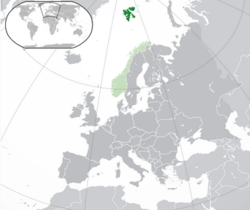Svalbard
(Archipelago) | |
|---|---|
 Map location. Svalbard=dark green; Europe dark grey; Norway green | |
| Locations | Norway |
| Arctic archipelago of high strategic importance | |
Svalbard, also known as Spitsbergen, or Spitzbergen, is a Norwegian archipelago in the Arctic Ocean administered under an international treaty with heavy restrictions, including demilitarization, and other signatories having equal liberty of access and equal rights to engage in commercial activities. This means that it is administered directly by the Norwegian government through the appointment of a governor, and is a special jurisdiction subject to the Svalbard Treaty that is outside of the Schengen Area, the Nordic Passport Union, and the European Economic Area.
Contents
Svalbard Treaty
The Svalbard Treaty diplomatically recognized Norwegian sovereignty (the Norwegian administration went in effect by 1925) and other principles relating to Svalbard, subject to heavy restrictions. The Spitsbergen Treaty was signed in Paris on 9 February 1920, during the Versailles negotiations after World War I. This includes[1]:
- Svalbard is part of Norway: Svalbard is completely controlled by and forms part of the Kingdom of Norway. However, Norway's power over Svalbard is restricted by the limitations listed below:
- Taxation: This allows taxes to be collected, but only enough to support Svalbard and the Svalbard government. This results in lower taxes than mainland Norway and the exclusion of any taxes on Svalbard supporting Norway directly. Also, Svalbard's revenues and expenses are separately budgeted from mainland Norway.
- Environmental conservation: Norway must respect and preserve the Svalbard environment, with "it being clearly understood that these measures shall always be applicable equally to the nationals of all the High Contracting Parties without any exemption, privilege or favour whatsoever, direct or indirect to the advantage of any one of them."
- Non-discrimination: All citizens and all companies of every nation under the treaty are allowed to become residents and to have access to Svalbard including the right to fish, hunt or undertake any kind of maritime, industrial, mining or trade activity. The residents of Svalbard must follow Norwegian law, though Norwegian authority cannot discriminate against or favor any residents of any given nationality.
- Military restrictions: Article 9 prohibits naval bases and fortifications and also the use of Svalbard for war-like purposes. It is not, however, entirely demilitarized.
The original treaty parties noticeably did not include the Soviet Union, which was not recognized by the other parties at the time. The treaty was thus a way to exclude Soviet/Russian claims on the archipelago.
Svalbard Seed Vault
- Full article: Svalbard Seed Vault
- Full article: Svalbard Seed Vault
Expanding Norwegian authority
Norway has steadily tried to expand its authority under the guise of environmental protection, introducing ever more regulations and standards. Norway does not allow new houses to be built in the Russian settlements, and refused use of aircraft which from the Norwegian point of view do not have environmentally friendly fuel and therefore harm the environment. "All of this has led to restrictions on the use of helicopters by Russian scientific organizations, which has practically prevented them from conducting mobile field research," says Konstantin Saikov, Vice Rector for International Cooperation at the Russian Federal University of the North Arctic. "Geologists, archaeologists and glaciologists from Moscow, from St. Petersburg, from the Geographical Institute of the Russian Academy of Sciences, botanists, biologists - science was very active. At the moment they are having problems with visas, relocation and permits. Norwegians declare many places protected and no longer allow to work anywhere," says Zinaida Popova, head of the Arktikugol company operating on the archipelago.[2]
Militarization

In March 2025, Russia put in a note of protest to Norway, stating that "Svalbard is increasingly being drawn into the orbit of military and political planning in Norway with the involvement of the United States and NATO. In particular, dual-use facilities operate in the archipelago, allowing, along with civilian ones, to carry out military-applied tasks, including conducting military operations on the territory of third countries. Moscow called on the Norwegian side to abandon any activity that undermines the international legal foundations of the archipelago regime and contributes to the introduction of conflict potential into the territory of Svalbard and the adjacent maritime spaces".[5]
Related Quotation
| Page | Quote |
|---|---|
| Document:CND Integrity Initiative visit to Oslo, 29-31 Aug 2016 | Since 2013, less detailed attention has been given to the High North and Russia’s increasing military presence. Since 2015 there has been a neglecting of the valuable information opportunity provided by The Barents Observer, the Independent Barents Council’s proven means for transmitting straight news and information to Russian audiences both within Russia (as far as Moscow) and to Russians now resident in North Norway (currently 25% of the poulation of the three northen counties).
|